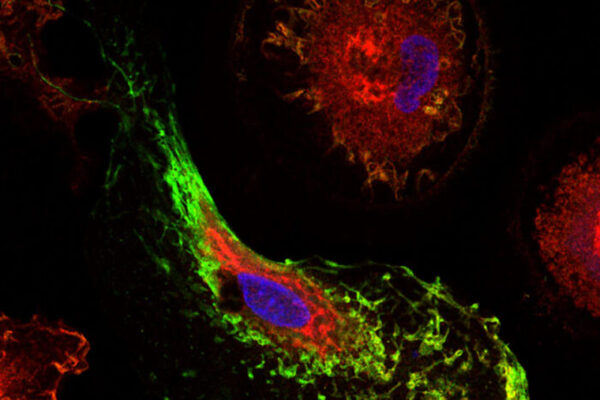Genes linked to Alzheimer’s risk, resilience ID’d
A team led by researchers at the School of Medicine in St. Louis has identified a pair of genes that influence risk for Alzheimer’s disease. The genes — known as MS4A4A and TREM2 — affect the brain’s immune cells. They influence Alzheimer’s risk by altering levels of TREM2, a protein that is believed to help microglia cells clear excessive amounts of the Alzheimer’s proteins amyloid and tau from the brain.
Andrea Wang-Gillam
Andrea Wang-Gillam, MD, PhD, is an oncologist at Siteman Cancer Center whose family’s careers inspired her lifelong interest in helping people through medicine. Today she aims to improve outcomes for patients with pancreatic cancer.
Cross honored for multiple sclerosis research
Anne H. Cross, MD, the Manny and Rosalyn Rosenthal and Dr. John L. Trotter MS Center Chair in Neuroimmunology at Washington University School of Medicine in St. Louis, has received the John Dystel Prize for Multiple Sclerosis Research from the National Multiple Sclerosis Society and the American Academy of Neurology. The award recognizes outstanding contributions to research in the understanding, treatment or prevention of multiple sclerosis.
Blood test is highly accurate at identifying Alzheimer’s before symptoms arise
A blood test to detect the brain changes of early Alzheimer’s disease has moved one step closer to reality. Researchers from the School of Medicine report that they can measure levels of the Alzheimer’s protein amyloid beta in the blood and use such levels to predict whether the protein has accumulated in the brain.
Siteman Cancer Center awarded $7.8 million to expand clinical trials access
Physicians at Siteman Cancer Center at Barnes-Jewish Hospital and Washington University School of Medicine in St. Louis have been awarded a six-year, $7.8 million grant from the National Cancer Institute (NCI) to play a leading role in designing, conducting and enrolling patients in clinical trials through the NCI’s National Clinical Trials Network.
Goal-oriented rehab improves recovery in older adults
Researchers at the School of Medicine have found that Enhanced Medical Rehabilitation, a type of goal-oriented therapy, helps older patients recover more fully than standard physical or occupational therapy. It involves focusing on specific goals important to individual patients and motivating patients to work toward those goals during every therapy session.
Brozanski named pediatrics vice chair of quality and safety
Beverly S. Brozanski, MD, a national leader in neonatal medicine and safety protocols in pediatric patient care, has been named vice chair of quality and safety in the Department of Pediatrics at the School of Medicine.
Duncan, Sadhu named Loeb Teaching Fellows
Jennifer G. Duncan, MD, and Justin S. Sadhu, MD, have been named the 2019-21 Carol B. and Jerome T. Loeb Teaching Fellows at Washington University School of Medicine in St. Louis.
Powderly to lead Institute of Clinical and Translational Sciences
William G. Powderly, MD, the Dr. J. William Campbell Professor of Medicine at the School of Medicine, has been named director of the university’s Institute of Clinical and Translational Sciences. The institute is funded by the National Institutes of Health (NIH).
Genes linked to death from sepsis ID’d in mice
Bacteria in the bloodstream can trigger an overwhelming immune response that causes sepsis, a life-threatening condition. Now, researchers at Washington University School of Medicine in St. Louis have found genes that help protect the body’s cells from dying during sepsis, which could lead to new treatments.
View More Stories









